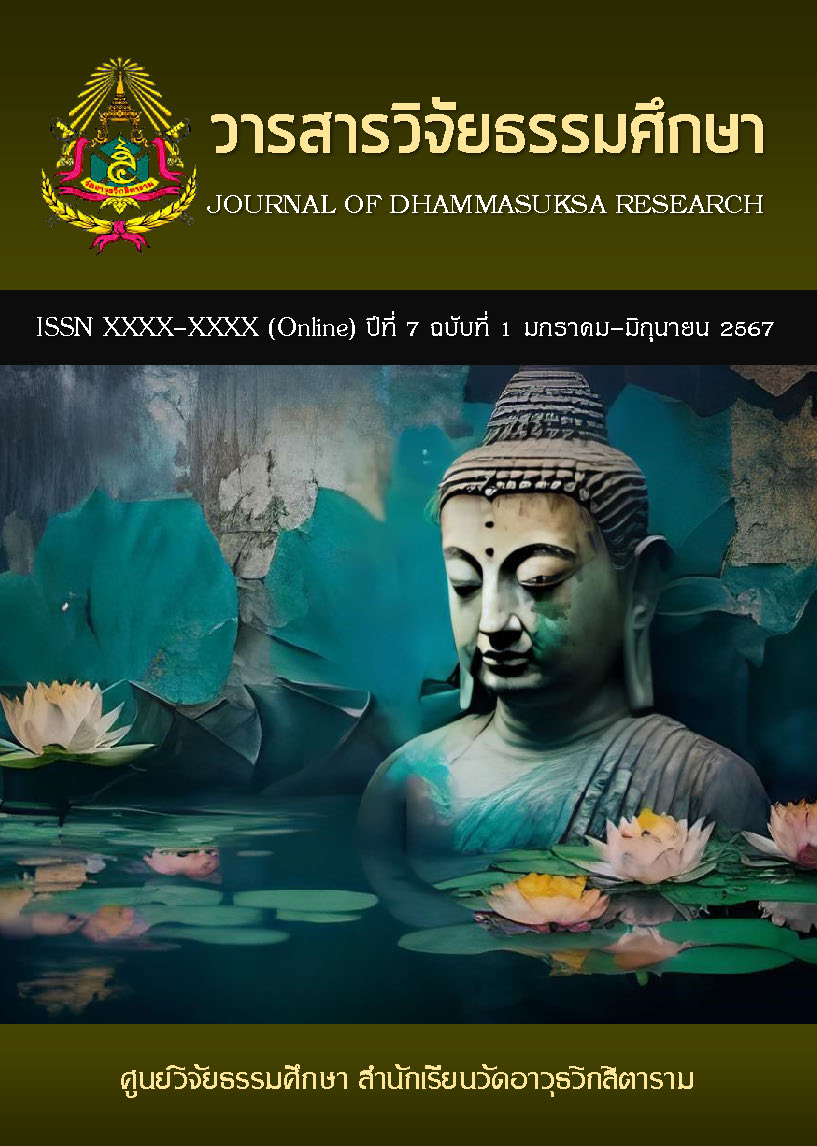A STRUCTURAL EQUATION MODELING ANALYSIS OF FACTORS AFFECTING TEACHERS’ COMMITMENT FOR THE UNIVERSITIES IN SHENYANG UNDER LIAONING PROVINCE
คำสำคัญ:
Factors Affecting Teacher’s Commitment, Universities in Niversities in Shenyang, Liaoning Provinceบทคัดย่อ
The objectives of this research were: (1) To propose a structural equation model of the influencing factors of teachers' commitment in colleges and universities in Shenyang, which is consistent with the empirical data. (2) Investigate the direct and indirect factors affecting teachers' commitment in Shenyang.
Most of the process used in the study is a quantitative study to determine the reasons that affect the teaching management commitment of teachers in Shenyang University. The number of people is 10,206. Using proportional stratified sampling method, a total of 456 people. The instruments for data collection were semi-structured interviews and a five-point rating scale questionnaire. The statistics used for data analysis were descriptive statistics and confirmatory factor analysis.
The research findings revealed that: (1) The statistical significance of the Structural Equation Model SEM of the influencing factors of college teachers' engagement in Shenyang City reaches the 0.05 level. 0.972, AGFI = 0.959, CFI = 0.997, RMSEA = 0.020. The overall results show that the Hypothetical Structural Equation Model is consistent with the empirical data. (2) The quality of working life has a positive and direct impact on teacher engagement. Quality of work life has positive indirect effects on teacher commitment through teacher motivation, teacher professional attitude, and self-efficacy. Teacher motivation has a positive indirect effect on teacher commitment. Through teacher self-efficacy. Teachers' professional attitude has a positive and direct impact on teachers' input. Teachers' professional attitude has a positive indirect effect on teachers' commitment. Through teacher self-efficacy and teacher self-efficacy has a positive direct impact on teacher commitment.
เอกสารอ้างอิง
Brown. (1980). Organization theory and management: A macro approach. New York: John Wiley and Sons.
Brown and Leigh. (1996). A New Look at Psychological. Journal Applied Psychology, 8(4), 358–368.
Cascigo, W. F. (1992). Manage Human Resources: Productivity, Quality of Work Life, Profits. New York: Mc Graw Hill.
Chan, K. (2006). In-service Teachers’ Motives and Commitment in Teaching. Hong Kong Teachers’ Centre Journal, 5, 112–128.
Prasad Babu; T.J.M.S. Raju. (2013). Attitude of Student Teachers Towards Their Profession. IJSSIR, Vol.2 (1), January (2013).
Emtinan Alqurashi. (2016). Self-Efficacy In Online Learning Environments: A Literature Review, Home Archives Vol. 9 No. 1 (2016) Articles.
Elshareif, Elgilani; Mohamed, Elfadil A. (2021). The Effects of E-Learning on Students' Motivation to Learn in Higher Education. Online Learning, v25 n3 p128-143 Sep 2021.
Gong Yunfeng. (2011). Research on the Construction of Teachers' Network Learning Community Based on Personal Knowledge Management.
Hana Ovesleová. (2014). User-Interface Supporting Learners’ Motivation and Emotion: A Case for Innovation in Learning Management Systems. DUXU 2016: Design, User Experience, and Usability: Novel User Experiences pp 67–75.
Jiang Peijun. (2018). Dedication Spirit - Intrinsic Requirements of Teachers' Professional.
Ethics Kahn. (1990). Psychological Couditions of Personal Engagement and Disengagement at Work. Academy of Management Journal, 33, 692–274.100
Wichadee, Saovapa. (2014). Students' Learning Behavior, Motivation and Critical Thinking in Learning Management Systems. Journal of Educators Online, v11 n3 Jul 2014.
Yun Zheng, Jianfeng Wang, William Doll, Xiaodong Deng & Melvin Williams. (2018). behaviour & information technology.
He, B., Li, Z., & Zheng, H. (2014). Content structure model and validation study of intercultural leadership: A case study of Sino-German intercultural teams. Economics and Management, (12), 83-94.
Li Jiang. (2022). Application of Lingnan non-material cultural heritage in art education of universities in the Greater Bay Area: a case study of Xing Lion in Foshan. Mass Art, (23), 187-189.
Li, J. Y. (2022). A survey of intercultural sensitivity in the new media environment. Forum on Communication, 5(14), 82-84.
Liu, Y. (2021). The generation logic and construction path of cross-cultural leadership under the background of "One Belt One Road". Leadership Science Forum, (01), 132-135.
Schneider, S. C., & Zhang, G. (2019). Managing Across Cultures. Machinery Industry Press.
Zhang Ting, Wang Xiaohui, Zhou Fan. (2021). Cross-cultural Communication Leadership and Arts Education in Universities in the Guangdong-Hong Kong-Macao Greater Bay Area. Art Education Research, 2, 83-89.
ไฟล์ประกอบ
เผยแพร่แล้ว
รูปแบบการอ้างอิง
ฉบับ
ประเภทบทความ
หมวดหมู่
สัญญาอนุญาต
ลิขสิทธิ์ (c) 2024 วารสารวิจัยธรรมศึกษา

อนุญาตภายใต้เงื่อนไข Creative Commons Attribution-NonCommercial-NoDerivatives 4.0 International License.



